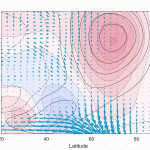Earth’s stratosphere is shrinking due to carbon emissions0
- Earth Mysteries, From Around the Web
- May 24, 2021
“It is shocking. This proves we are messing with the atmosphere up to 60 kilometres,” says researcher.

“It is shocking. This proves we are messing with the atmosphere up to 60 kilometres,” says researcher.

Source: New Scientist When Earth was young, its surface was probably covered in a magma ocean, and the gases rising from that seething sea may have provided it with an atmosphere nearly identical to the toxic one present on Venus today. Earth’s early magma ocean was probably created by a collision with a Mars-sized object

Air samples taken at a remote research station in the Himalayan mountains revealed pollutants are travelling from thousands of kilometres away and could increase glacial melting rates.

The world has some good news to look forward to amid the novel coronavirus outbreak: a hole in the ozone layer is in recovery.

To pull off this atmospheric feat to create this perfect storm, the upper-level support with the jet stream is off-the-charts ideal

Source: Science Alert Even before the Chicxulub asteroid hit Earth 66 million years ago, dinosaurs and other life forms were dealing with toxic mercury levels, a new study suggests. The fresh evidence serves up even more contention in a “long-running and bitter” debate over how the dinosaurs died all those years ago. While some scientists

The gaseous layer that wraps around Earth reaches up to 630,000 kilometers away, or 50 times the diameter of our planet, according to a new study based on observations by the ESA/NASA Solar and Heliospheric Observatory, SOHO, and published in AGU’s Journal of Geophysical Research: Space Physics.

The two world powers have reportedly been working together on a series of controversial experiments.

Did you feel that? Does it suddenly feel a little bit stuffier in here to you? Does it feel like, I don’t know… outer space just got 12 miles (20 kilometers) closer?

Changes in the strength of the stratosphere’s polar vortex pulse downward, affecting weather all the way to the surface.